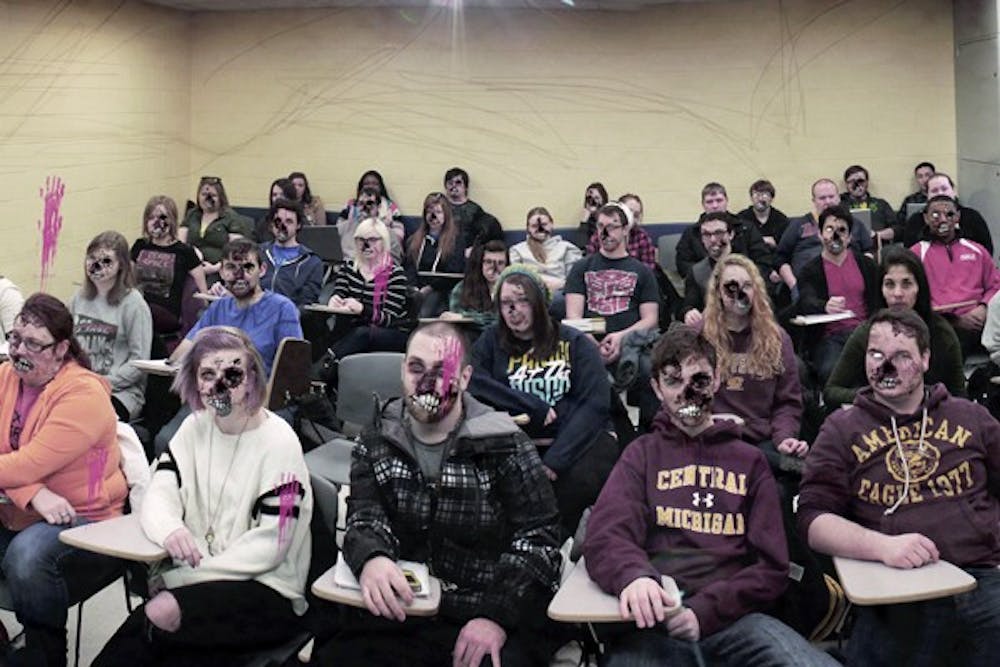Revelation to 'The Walking Dead' class chews on students brains, offers insight
As society becomes more obsessed with the idea of the world coming to an end in the wake of a zombie apocalypse, creating a course exploring the nuances of such a scenario was inevitable.
From this fascination of an undead end of days, religion professor Kelly Jean Murphy created a course at Central Michigan University that has intrigued students and unexpectedly attracted national attention.
Within the past two weeks, 12 Michigan media outlets and more than 200 out-of-state news publications including Huffington Post, Boston Globe, Washington Post and have shown interest in the class.
"I was caught off guard by all the news contacts, but it is exciting,” Murphy said. “The students are doing a wonderful job with the class. They are asking lots of important questions and becoming involved in discussions.”
Rachel Perkins, who serves as university communication associate director of public relations and social media, wrote the original press release that has picked up traction.
Beyond the United States, Perkins has noticed publicity for the class has reached a world-wide audience.
"It has been really exciting to see the media pick up the story across the nation,” Perkins said. “We've had coverage in Canada, as well, (and) I've been contacted by a newspaper in Lebanon and a publication in Hong Kong.”
Murphy pitched the Revelation to "The Walking Dead" course, known as REL397D, to the Religion and Philosophy department as a special topics class.
It became an course last semester, giving students an outlet to interpret the zombie apocalypse contradiction.
“I came up with the class," she said. "The reason being is because lots of people are teaching about zombies across the country. Zombies are everywhere, and it is interesting to imagine what might happen and how we might respond. I am also interested in the ancient apocalyptic literature and wanted to compare them to present literature."
The course curriculum allows students to compare ancient and contemporary literature and beliefs to interpret why end of the world ideas have changed over time.
“A lot of ancient apocalyptic literature was written by people that were being oppressed by other powerful empires, serving as a way of hoping that (days) will get better,” Murphy said. "Today, we have the end of the world interest, but with a more negative outcome – a zombie take over. Zombies are at the end of the day not particularly hopeful, so there is a shift of how we think of the end of the world.”
Murphy does not believe the zombie apocalypse will actually happen, but thinking about it allows us to ask important questions about what it means to be human, by asking what can we tell about society by the way people imagine the end of the world?
"Why are we, as a culture, so interested in this supposed myth of the zombie take over? What is their reasoning behind it?” Murphy asked.
In four weeks, the class already has Monroe junior Carl Huber gaining a different perspective.
Huber said he enjoys classes like Revelation to "The Walking Dead" because they help him to not take things at face value, but rather analyze things in popular culture.
“In this class, you are able to realize where a lot of these ideas stem from about the zombie apocalypse,” Huber said. “You learn how the ancient views don’t have anything to do with the modern view of what zombies truly are. Society has twisted the meaning and taken writings and ideas out of context and morphed them and compared them to the zombies we view on 'The Walking Dead.'”
While Huber is a religion and sociology double major, he said there are other students in the class who are not, and would recommend it to any students.
“I think it is an interesting class that could be beneficial for anybody,” he said. “You get a better understanding of contemporary views of the horror genre and why people are so intrigued with the end of the world being affiliated with zombies.”
Fremont senior Benjamin Schultz said he enrolled because the course name was interesting and accommodated his liking of “The Walking Dead” television series.
“I don’t know much about religion and I thought this would be an interesting way to find out and learn about an aspect of it,” Schultz said. “In the beginning, I thought it would be more about 'The Walking Dead' TV show, but it’s actually how the idea of the show relates to apocalyptic readings through different religions.”
The three-credit class is already scheduled to be taught next spring, hoping to attract more students.
“You can’t really find or create a story of the world ending in a nice way," Schultz said. "It makes it more interesting if people think a zombie takeover will occur. If the world ends, it wont be a thrilling idea; I think that’s why people have come up with this idea of the zombie apocalypse.”




